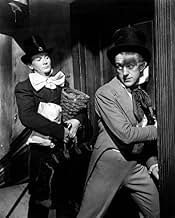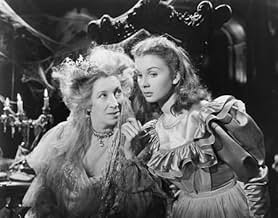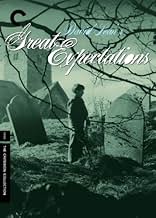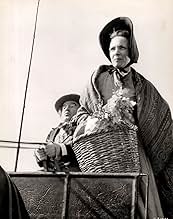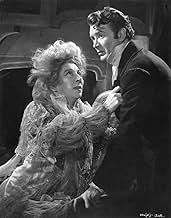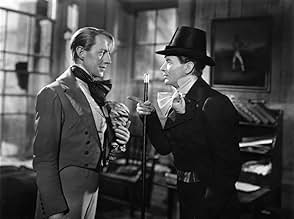IMDb RATING
7.8/10
28K
YOUR RATING
A humble orphan boy in 1810s Kent is given the opportunity to go to London and become a gentleman, with the help of an unknown benefactor.A humble orphan boy in 1810s Kent is given the opportunity to go to London and become a gentleman, with the help of an unknown benefactor.A humble orphan boy in 1810s Kent is given the opportunity to go to London and become a gentleman, with the help of an unknown benefactor.
- Won 2 Oscars
- 11 wins & 4 nominations total
Tony Wager
- Young Pip
- (as Anthony Wager)
O.B. Clarence
- The Aged Parent
- (as O. B. Clarence)
Featured reviews
I read the novel decades ago, but from what I remember the major points and most of the minor points of the novel are intact. The novel and the film weave a tale of a 19th century England completely lacking in compassion, and that always went doubly so for orphans such as Pip, yet he does encounter more than his share of good luck.
Of course the most interesting character in the novel is Miss Haversham. In the film as in the novel she is dumped at the altar on her wedding day in her youth and has harbored a grudge against the entire male sex since then and has lived as though stuck in that day for decades, still wearing her rotting wedding dress. What I don't understand is why the film does not include her being financially defrauded by her fiance as the novel does. The novel weaves a tale of an unbelievably small world, but the film omits a couple of the more unbelievable plot turns to its credit.
The lawyer, Mr. Jaggers, who attends to Pip's affairs when he is in London, is also a most interesting character. He has a hangman's noose as a souvenir in his office and also seems to be actively collecting the death masks of the recently executed as a new one pops up every time Pip visits him. Yet when he discusses the matter of the death penalty and criminal justice in England Jaggers truly seems to get the cruel randomness of those institutions.
One thing I can say without spoiling anything is how completely unrecognizable Alec Guinness is as Herbert Pocket, Pip's roommate in London. He doesn't even have that trademark gravelly voice at this point, his first credited film appearance.
I don't even like costume dramas or period pieces, but I highly recommend this one. The fine acting by the cast and Lean's direction really drew me into the story.
Of course the most interesting character in the novel is Miss Haversham. In the film as in the novel she is dumped at the altar on her wedding day in her youth and has harbored a grudge against the entire male sex since then and has lived as though stuck in that day for decades, still wearing her rotting wedding dress. What I don't understand is why the film does not include her being financially defrauded by her fiance as the novel does. The novel weaves a tale of an unbelievably small world, but the film omits a couple of the more unbelievable plot turns to its credit.
The lawyer, Mr. Jaggers, who attends to Pip's affairs when he is in London, is also a most interesting character. He has a hangman's noose as a souvenir in his office and also seems to be actively collecting the death masks of the recently executed as a new one pops up every time Pip visits him. Yet when he discusses the matter of the death penalty and criminal justice in England Jaggers truly seems to get the cruel randomness of those institutions.
One thing I can say without spoiling anything is how completely unrecognizable Alec Guinness is as Herbert Pocket, Pip's roommate in London. He doesn't even have that trademark gravelly voice at this point, his first credited film appearance.
I don't even like costume dramas or period pieces, but I highly recommend this one. The fine acting by the cast and Lean's direction really drew me into the story.
As a fan of many so-called classic films, I am nonetheless aware that there is some validity to the criticism that early movies (say, anything before Brando in Streetcar) as a rule have less vitality than their modern counterparts, are formulaic to a fault, and strain the limits of modern attention spans more than can be fully blamed on the viewer. Great Expectations treads miles clear of any of these criticisms, and so I recommend it in particular to anyone who has a general disdain for films that a) were released in the first half of the 20th century and/or b) were shot in black and white. Here is one that can change your mind.
Naturally, given the talents of the author, the plot itself leaves little to be desired. Further, David Lean, his cast, and his crew, have done a splendid job translating Dickens to the screen. This is indeed, as the Criterion Collection folks have classified it, one of the "Great Adaptations." I doubt that there is a better cinematic adaptation of any Dickens novel and am almost certain there is none in which the Dickensian English dialogue flows more pleasantly and naturally. The actors herein deliver Dickens as Olivier himself delivered Shakespeare. Nor is this an unimportant accomplishment; having to spend a couple of hours listening to actors who sound more like they are delivering a series of quotes (though admittedly they are) than that they are actually conversing can be positively unbearable. Indeed I think that's the main thing that people are hitting upon when, with broad brush-strokes, they paint older films as tedious. Great Expectations is the antidote to just this attitude.
If you are a lover of classic films, you have likely already seen this one or will do so regardless of my review, but if, on the other hand, you entertain the possibility of watching Great Expectations with a deep-seated skepticism I implore you to give it a chance. I have every confidence you'll be pleasantly surprised and find yourself drawn into what is, after all, a fascinating story.
Naturally, given the talents of the author, the plot itself leaves little to be desired. Further, David Lean, his cast, and his crew, have done a splendid job translating Dickens to the screen. This is indeed, as the Criterion Collection folks have classified it, one of the "Great Adaptations." I doubt that there is a better cinematic adaptation of any Dickens novel and am almost certain there is none in which the Dickensian English dialogue flows more pleasantly and naturally. The actors herein deliver Dickens as Olivier himself delivered Shakespeare. Nor is this an unimportant accomplishment; having to spend a couple of hours listening to actors who sound more like they are delivering a series of quotes (though admittedly they are) than that they are actually conversing can be positively unbearable. Indeed I think that's the main thing that people are hitting upon when, with broad brush-strokes, they paint older films as tedious. Great Expectations is the antidote to just this attitude.
If you are a lover of classic films, you have likely already seen this one or will do so regardless of my review, but if, on the other hand, you entertain the possibility of watching Great Expectations with a deep-seated skepticism I implore you to give it a chance. I have every confidence you'll be pleasantly surprised and find yourself drawn into what is, after all, a fascinating story.
This adaptation of Charles Dickens's classic novel, directed by David Lean from a script he co-adapted, and photographed by Guy Green, is a miracle of invention, economy and detail. Every piece on every set; every line of dialogue; every gesture and line reading of every actor; every black-and-white frame of this beautiful film seems perfect. Dickens's characters, situations and themes are all vividly dramatized. Pip, Pocket, Joe, Mr. Jaggers, Magwitch andunforgettablyMiss Havisham, are all here and all ready to move, amuse, frighten and entertain anyone willing to spend time with them.
I haven't read the book since I was thirteen. I vividly remember Miss Havisham, but I don't remember noting the contrast between her and Magwitch, the ex-convict. She becomes bitter and vengeful after a great heartbreak; he becomes great of heart through one small act of kindness. That's what made the movie for me this time; but clearly there's richness to spare for future viewings.
There is so much here not only for Dickens fans, but for anyone who loves movies. I especially liked that shot from Pip's point of view as he becomes sick. It's the kind of crazy effect beloved of filmmakers, too; but I love it not so much for itself, but for being the right shot at the right moment. Some directors hide, others show off, but directors like David Lean know how to do both and know when to do which.
I haven't read the book since I was thirteen. I vividly remember Miss Havisham, but I don't remember noting the contrast between her and Magwitch, the ex-convict. She becomes bitter and vengeful after a great heartbreak; he becomes great of heart through one small act of kindness. That's what made the movie for me this time; but clearly there's richness to spare for future viewings.
There is so much here not only for Dickens fans, but for anyone who loves movies. I especially liked that shot from Pip's point of view as he becomes sick. It's the kind of crazy effect beloved of filmmakers, too; but I love it not so much for itself, but for being the right shot at the right moment. Some directors hide, others show off, but directors like David Lean know how to do both and know when to do which.
The Dickens novel is given classic treatment in David Lean's "Great Expectations". The opening scene is so atmospheric it sets the tone for the convoluted story to follow. The earlier scenes with young Pip are the most enjoyable for me--especially those involving Estella (Jean Simmons) and Miss Havisham (Martita Hunt).
Brilliant performances from all concerned. John Mills is wholly satisfying as the adult Pip and Valerie Hobson as the adult Estella--but it is Martita Hunt's Miss Havisham, sitting among the ruined finery of a wedding that never took place, everything exactly the way it was on that fateful day--and waging war on men ever since--that lingers in the memory.
Some of the best black and white photography seen until that time and an absorbing story with twists and surprises that have logical explanations. Compares favorably with the other great British film, "Oliver Twist" and, by all means, recommended viewing.
Not only worthy of its Best Picture nomination, it should have won over "Gentleman's Agreement" which now seems preachy and artificial.
Brilliant performances from all concerned. John Mills is wholly satisfying as the adult Pip and Valerie Hobson as the adult Estella--but it is Martita Hunt's Miss Havisham, sitting among the ruined finery of a wedding that never took place, everything exactly the way it was on that fateful day--and waging war on men ever since--that lingers in the memory.
Some of the best black and white photography seen until that time and an absorbing story with twists and surprises that have logical explanations. Compares favorably with the other great British film, "Oliver Twist" and, by all means, recommended viewing.
Not only worthy of its Best Picture nomination, it should have won over "Gentleman's Agreement" which now seems preachy and artificial.
When David Lean directed Great Expectations, he used black and white, even though color was available. From the very first scene, you see that the black and white brings out a quality in the film, that wouldn't have been achieved with color. The black and white makes the film seem simpler than it really is. Great Expectations is a film, which ends very nicely for the characters, but their journeys throughout the film are not.
Pip sees himself for the rude snob he became, and Estella prides herself for being a heartless, ruthless bitch (for lack of a better word), and Miss Havisham is cold, and simply out to destroy men. The only person in this film who is not arrogant, or evil is the simple Joe.
I am far from a film expert. Infact, I only watched this movie because I am studying Great Expectations at school. However, after hours of in-depth discussion, there is so much more to this film than meets the eye. My favorite scenes are those in the first quarter of an hour. Lean's use of Silhouettes gives the search for the two escaped convicts a feel of war, and creates an atmosphere of tension very well. It also introduces the key characters in the story excellently.
As far as the story goes, I found it much easier on the head to watch than the book was to read. While it wasn't close in length to books i've read before (I think it's shorter than my little brother's "Harry Potter" books), it took me close to 30 hours to read. The movie compacts the majority of the book into 2 hours of film. The exclusion of characters like Orlick I have no problem with, as they are nearly completely irrelevant to the story. Lean explains the death of Pip's sister in less than 10 seconds, while the book takes somewhere in the region of 10 pages.
The acting is excellent. Alec Guinness was the only actor I had heard of, and that was only thanks to George Lucas. John Mills was interesting to watch, and after seeing the movie, I didn't know weather to like Pip for how he ended up, or to see him for the nasty person he had changed into (and come back from).
Only when watching it for the second time, did i realise the thought behind the direction. When Magwitch reappears, the atmosphere from their first meeting is created exactly; even the wind sounds the same. The sets were also incredible, and remade 19th century England perfectly. Ms. Havisham's `Statis House' was particularly memorable for me, as it is exactly how I pictured it from reading.
David Lean's Great Expectations set a benchmark in 1946 for great movies. It was nominated and won several Oscars, and is still enjoyed today. Every aspect of this film was enjoyable, it tells a great story, and if you look closer, you will appreciate the art of film making a little more, as I have.
Pip sees himself for the rude snob he became, and Estella prides herself for being a heartless, ruthless bitch (for lack of a better word), and Miss Havisham is cold, and simply out to destroy men. The only person in this film who is not arrogant, or evil is the simple Joe.
I am far from a film expert. Infact, I only watched this movie because I am studying Great Expectations at school. However, after hours of in-depth discussion, there is so much more to this film than meets the eye. My favorite scenes are those in the first quarter of an hour. Lean's use of Silhouettes gives the search for the two escaped convicts a feel of war, and creates an atmosphere of tension very well. It also introduces the key characters in the story excellently.
As far as the story goes, I found it much easier on the head to watch than the book was to read. While it wasn't close in length to books i've read before (I think it's shorter than my little brother's "Harry Potter" books), it took me close to 30 hours to read. The movie compacts the majority of the book into 2 hours of film. The exclusion of characters like Orlick I have no problem with, as they are nearly completely irrelevant to the story. Lean explains the death of Pip's sister in less than 10 seconds, while the book takes somewhere in the region of 10 pages.
The acting is excellent. Alec Guinness was the only actor I had heard of, and that was only thanks to George Lucas. John Mills was interesting to watch, and after seeing the movie, I didn't know weather to like Pip for how he ended up, or to see him for the nasty person he had changed into (and come back from).
Only when watching it for the second time, did i realise the thought behind the direction. When Magwitch reappears, the atmosphere from their first meeting is created exactly; even the wind sounds the same. The sets were also incredible, and remade 19th century England perfectly. Ms. Havisham's `Statis House' was particularly memorable for me, as it is exactly how I pictured it from reading.
David Lean's Great Expectations set a benchmark in 1946 for great movies. It was nominated and won several Oscars, and is still enjoyed today. Every aspect of this film was enjoyable, it tells a great story, and if you look closer, you will appreciate the art of film making a little more, as I have.
Did you know
- TriviaSir Alec Guinness admired the way Sir David Lean directed him, singling out a close-up in which he had to laugh out loud, and which he struggled to make look unmanufactured. Lean told him to forget about the whole thing, sat by his side, and made a little signal to the camera to start turning in the course of the conversation. He said something which made Guinness laugh and then said, "Cut." Guinness: "So he got this shot on a totally false premise, but thank God. I don't think I would have ever achieved it otherwise."
- GoofsAt the end, when Pip is persuading Estella to leave Satis House with him, a 'Chad' is clearly visible drawn on the screen behind him (Chads were a popular form of graffiti in the 1940s - a character with a big nose looking over a wall). Chad is a British term; the American equivalent would be Kilroy, as in 'Kilroy was here'.
- Crazy creditsThe identity of the actress playing Molly is never revealed, because this would constitute a spoiler.
- Alternate versionsIn some prints, after the fifteen minute "convict episode" at the beginning of the film ends, a voice-over by the adult Pip (John Mills) says, "it was a year later", as Mrs. Joe arrives home in the carriage. As now usually shown, there is no voice-over in this sequence.
- ConnectionsFeatured in Moscow in Madrid (1965)
Details
- Release date
- Country of origin
- Official site
- Language
- Also known as
- Grandes esperanzas
- Filming locations
- St Mary's Marshes, Kent, England, UK(opening sequence - Pip and Herbert Pocket ride in rowboat)
- Production company
- See more company credits at IMDbPro
Box office
- Budget
- £350,000 (estimated)
- Gross worldwide
- $33,408
- Runtime1 hour 58 minutes
- Color
- Aspect ratio
- 1.37 : 1
Contribute to this page
Suggest an edit or add missing content



